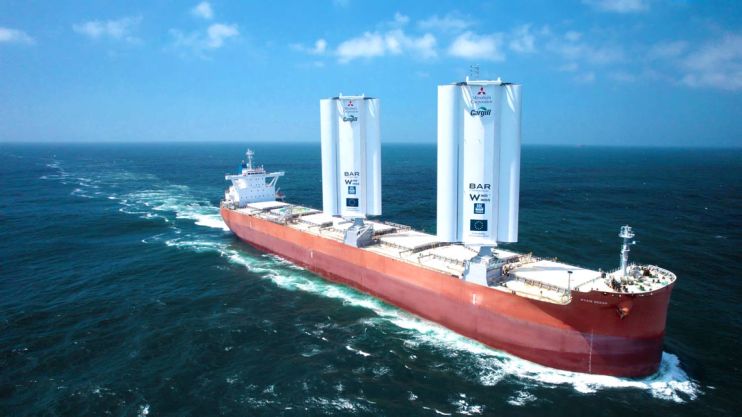New wind-powered cargo ship sets off on maiden voyage

A cargo ship that makes use of giant sails set out on its maiden voyage this morning, as industry watchers cheered the new ship’s potential to help decarbonise the shipping sector.
Pyxis Ocean, chartered by US-firm Cargill, uses British-made sales dubbed ‘WindWings,’ which are fitted to the deck of the ship and measure up to 37.5 metres in height.
Estimates suggest the technology could help decarbonise the average vessel by up to 30 per cent, as the shipping sector looks to cut fuel consumption ahead of looming deadlines set by the International Maritime Organisation (IMO) – the UN body that regulates the sector.
Cargill, one of the worlds biggest ship charterers, claim it could save 1.5 tonnes of fuel per sail, per day.
The Pyxis Oceans’ test run will see it sail from China to Brazil, with the performance of the WindWings closely monitored to determine whether there is potential for industry-wide adoption.
Jan Dieleman, president of Cargill’s Ocean transportation business, said the journey to decarbonisation was “exciting,” but noted that the technology “doesn’t come without risk.”
“We are not afraid to invest, take those risks and be transparent with our learnings to help our partners in maritime transition to a more sustainable future,” he said.
The comments come as the shipping industry bets on a variety of different technologies to meet looming net-zero targets, with fuels such as biofuels, liquefied natural gas, and hydrogen all in the mix.
According to the IMO, the shipping industry is responsible for around 2.1 per cent of global CO2 emissions and is highly dependent on fossil fuels.
It has currently set a deadline of 2050 to slash shippers’ emissions by half, from 2008 numbers.
John Cooper, CEO of BAR Technologies – the UK-based firm who designed the ‘WindWings’ technology – said that the sector required more innovation to meet the current deadlines.
“Wind is a near marginal cost-free fuel and the opportunity for reducing emissions, alongside significant efficiency gains in vessel operating costs, is substantial,” he argued.